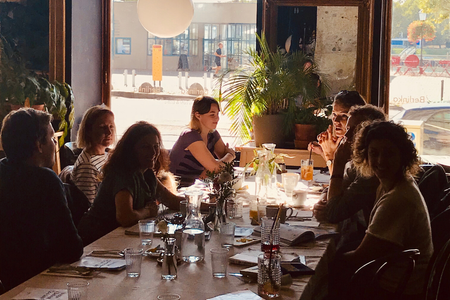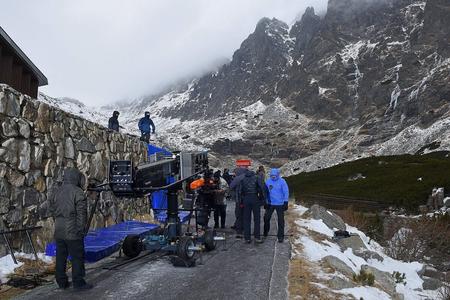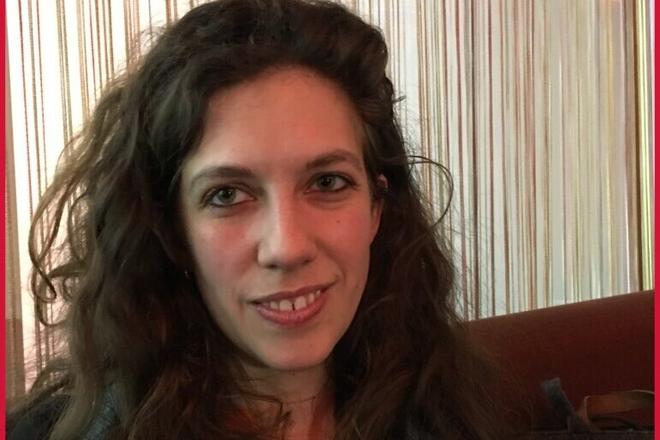With an interest and education in political science, sociology, documentary and film directing, Aline Fischer (39) started her career in filmmaking with several short films dealing with gender construction and border areas, with a focus on post-communist countries. Her fiction feature debut Meteor Street (2016) premiered at the Berlinale festival. In August 2020, she came to Bratislava as a WILD CARD participant of the Pop Up Film Residency initiative to work on the script for her sophomore feature The Entertainers.
What a joy it was in this year of crisis and general immobility due to the pandemic, to be able to go to Slovakia, to touch the beautiful blue Danube with my hands, to bathe my feet there. Taking off in the heart of summer after these long months of isolation while continuing to work on my European film project was a blessing in disguise.

Recently, I moved to Paris, yet somehow, central Europe is more familiar to me than the western half of France, my birthplace. I have spent over 10 years living in Berlin working as a film director, but when I arrived in Bratislava on August 2, 2020, I immediately felt at home.
Thanks to the Pop Up Film Residency, I was able to put my bags down in Bratislava’s Old Town and write my screenplay under the large acacias. Showers punctuated my writing work, sunny walks too. I found my cocoon in this place. Isolating myself from everything I know and focusing on my work has been more than precious to me, and without a doubt, it has helped me a lot in the writing process.
Reprieve for filmmakers
I have liked Bratislava, full of parks, avenues, and squares covered with pretty lawns and dotted with trees, for a long time. The old town and the district of the old synagogue are full of memories, vibrant with past tragedy, and crossed by the immense Most SNP (the bridge of the Slovak National Uprising) and narrow streets that lead to the great white Bratislava Castle.
After five days of work in the residential apartment, I was given an opportunity to join the 4 Elements Film Festival (4 živly) in Banská Štiavnica, a true pleasure after the cascading cancellations of festivals in recent months. I finally found an audience in theatres and especially in the large outdoor amphitheatre with a view of the mountains and the Calvary built above the city.
The programme was diverse, coherent and above all inspiring. The road movie Vanishing Point by Richard C. Sarafian, Slovak short films from the archives, Wojaczek by Lech Majewski, the screening of Punk Never Ends! by Juro Šlauka accompanied "live" by musician David Kollar, Beanpole by Kantemir Balagov, Ticket of No Return by Ulrike Ottinger, Climax by Gaspar Noé, and Papicha by Mounia Meddour were among those screened.
It was also great to meet other people at the festival who are facing similar questions and challenges in the field of cinema, because these are the kind of meetings that allow filmmakers to share doubts, questions, desires and ideas. By watching the scheduled films, I was able to digest the last days of writing and regenerate new ideas.
A script is born
During the residency, I got to meet Juro Šlauka and Ivo Miko, director and cinematographer of the Slovak film Punk Never Ends. I was struck by this film’s hard-hitting story and aesthetics, which closely resemble actual members of the real punk community. I also met the festival founders, film critics, filmmakers and other actors from the Slovak film network.

In the past, Banská Štiavnica, an incredible village located inside a caldera, was known for the extraction of silver and remains marked by a mining tradition. While walking to a nearby lake, I also discovered the childhood home of Dezo Hoffmann, the photographer of The Beatles and The Rolling Stones.
Back in Bratislava, I continued to work on my script while surveying the city from the Slovak Radio house, a peculiar upside down pyramid. I often walked through the park behind the Presidential Palace where I played pétanque with new friends I met by chance at the Street Food Fest and made my way up to the blue Art Nouveau St. Elisabeth church. The place that moved me the most was the cemetery, next to the park Medická záhrada – “Garden of Medics”. It was there that I saw the evidence of the city's multicultural past, fundamentally changed by successive wars and communism.
My stay ended with the birth of a new version of the script that I was able to analyse under the watchful eye of my mentor and with the screening of my first feature film METEORSTRASSE (Meteor Street) at Kino Lumière. How happy I was to discover the Slovak public present in the room, viewing METEORSTRASSE projected on the big screen, engaged in a discussion about the making of the film and its choices of staging.
This text is the result of The Slovak Spectator’s collaboration with the Pop Up Film Residency, which brings foreign filmmakers to Slovakia.
Author: Aline Fischer


 Aline Fischer (source: Courtesy of Aline Fischer)
Aline Fischer (source: Courtesy of Aline Fischer)